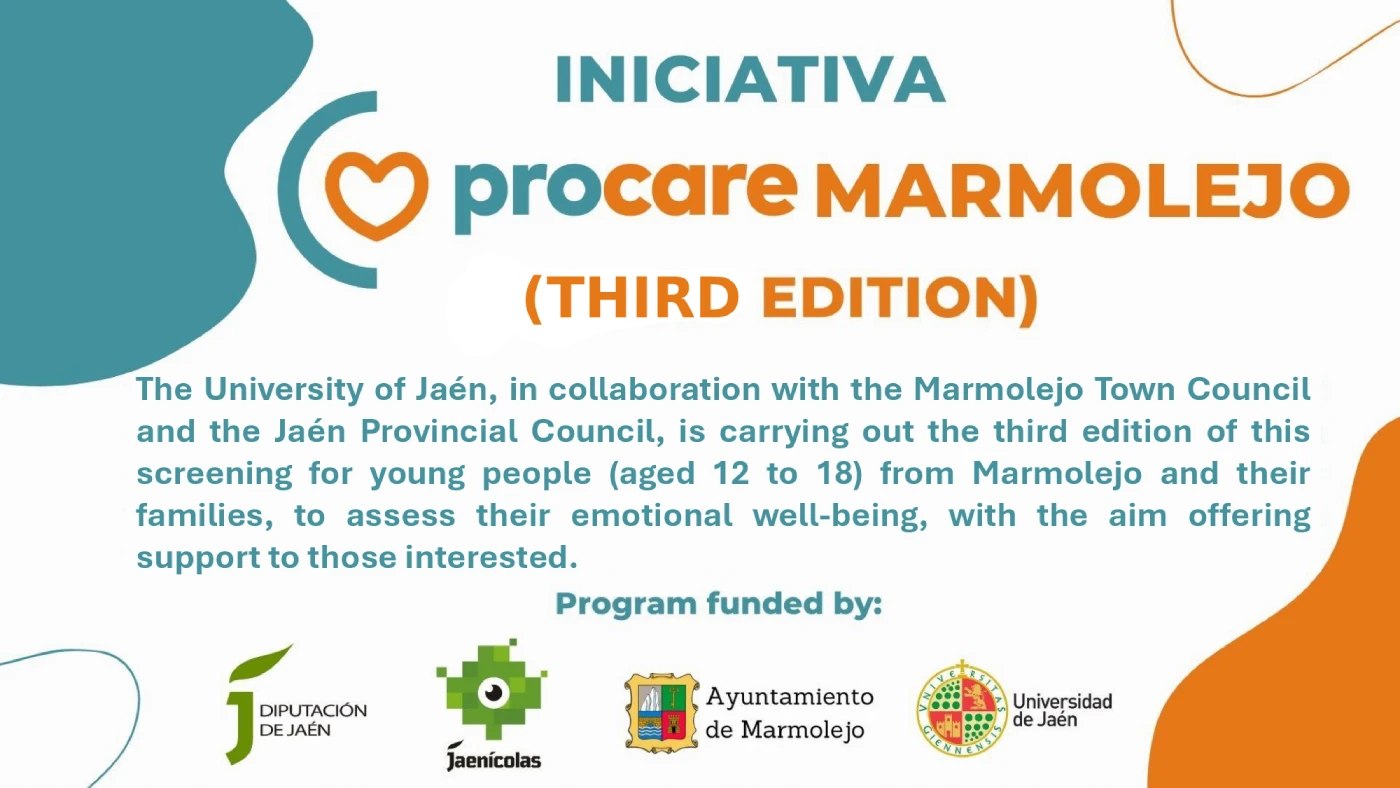PROCARE - MARMOLEJO INITIATIVE
The University of Jaén, in collaboration with the Marmolejo Town Council and the Provincial Council of Jaén, is launching this initiative, which aims to help teenagers aged between 12 and 18 in the province of Marmolejo and their families understand the emotional state of their children. To this end, PROCARE has created a survey aimed at teenagers aged between 12 and 18 in the municipality.
In addition, PROCARE is designed to help young people of this age improve their skills in coping with emotional difficulties (related to studies, health habits, communication within the family, situations of rejection, climate anxiety, etc.). The objective of PROCARE is to provide interested young people with the necessary tools to strengthen their emotional well-being and develop their resilience in the face of life’s adversities, thereby promoting better mental and emotional health.
The PROCORE implementation in Marmolejo for the third consecutive year has been promoted by Manuel Lozano, Mayor of Marmolejo, together with Pilar Lara, Councillor for Governance, Tourism, Promotion and Youth at Marmolejo Town Council, and Antonio Lara, Youth Officer at Marmolejo Town Council, thanks to funding from the Provincial Council of Jaén and the council’s own funds.
In addition, it is promoted by Luis Joaquín García, professor at the University of Jaén (UJA), director of the PROMOBIENESTAR University Chair, Promotion of Health and Emotional Well-being of Adolescents and Young People, as well as head of the HUM-836 Psychological Assessment and Treatment Research Group and the PROEMO network of excellence.
STAGES OF THE INITIATIVE
STAGE 1
It develops through possible ways:
- If the adolescent who wishes to participate wants to do so alongside their parents, they must access the link called ‘Family Link’. In this link, first, the parent (or at least one parent, carer or responsible person) fills in some sections regarding the emotional state of the minor, and then the child fills in other sections. The information about the adolescent’s emotional state will be sent to the email address provided by the family.
- If the adolescent who wishes to participate in the assessment decides to access it through the link called ‘Link for Adolescents +16’, they will only complete the sections of the survey that correspond to them (without the participation of their parents or carers). The information on their emotional state will be sent to the email address provided by the adolescent.
IMPORTANT: Adolescents over the age of 16 do not require the consent of a responsible adult. However, whenever possible, we recommend involving their families in the entire process. For this reason, it is preferable to access the programme via the link for families (In any case, we will respect the principle of confidentiality with the adolescent, i.e. we will not disclose any sensitive personal information that they do not wish to be disclosed or without prior agreement with them).
The aim is, on the one hand, to help determine whether the adolescent is emotionally healthy, at risk or high risk of emotional difficulties, or likely to develop an emotional problem.
All participants will receive information about their health and emotional well-being free of charge, as this phase serves as an emotional check-up.
STAGE 2
Young people who show signs of risk will be offered a workshop on emotional strengthening and resilience in the face of present and future adversities. In this way, they will learn to cope with risky situations and enhance their emotional skills. The PROCARE programme consists of seven group sessions lasting approximately one hour (via Google Meet), plus a total of five additional modules tailored to the risk factors identified. These additional modules will only be offered to those who present the risk factor in question and are aimed at:
- Additional module 1. Situations of peer violence (bullying and cyberbullying) and social rejection.
- Additional module 2. Poor health habits related to sleep, eating and body image.
- Additional module 3. Poor health habits related to excessive screen use or gaming.
- Additional module 4. Stressful situations (exams and climate anxiety).
- Additional module 5. Module for parents (4 sessions) aimed at improving parent-child interaction dynamics.
